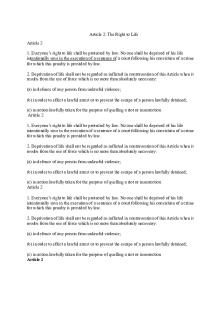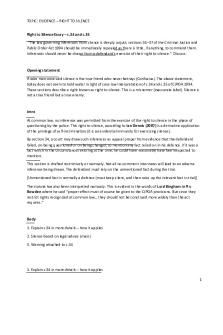Lecture 23 - Article 6 ECHR - Right to a Fair Trial PDF

| Title | Lecture 23 - Article 6 ECHR - Right to a Fair Trial |
|---|---|
| Course | Constitutional and Administrative Law |
| Institution | Anglia Ruskin University |
| Pages | 10 |
| File Size | 127.7 KB |
| File Type | |
| Total Downloads | 30 |
| Total Views | 129 |
Summary
Article 6 ECHR - Right to a Fair Trial...
Description
Constitutional and Administrative Law Lecture 23: Article 6 ECHR - Right to a Fair Trial
Article 6 European Convention on Human Rights • 6 (1) In the determination of his civil rights and obligations or of any criminal charge against him, everyone is entitled to a fair and public hearing within a reasonable time by an independent and impartial tribunal established by law. • Judgment shall be pronounced publicly but the press and public may be excluded from all or part of the trial in the interest of morals, public order or national security in a democratic society, where the interests of juveniles or the protection of the private life of the parties so require, or the extent strictly necessary in the opinion of the court in special circumstances where publicity would prejudice the interests of justice.
Article 6 ECHR • 6 (1) In the determination of his civil rights and obligations or of any criminal charge against him, ... • Civil litigation dimension • Criminal litigation dimension Note – not a public law dimension
Connects to: • Article 5 – Right to libertyan you think of exceptions to this right?
• Article 7 – No punishment without law (no retrospective punishment)Can you think of exceptions to this right?
• Article 13 – Effective remedy
Three stages of fair trial • pre–trial • during trial • after the trial
Article 6 in detail
Right to a fair trial 1. In the determination of his civil rights and obligations or of any criminal charge against him, everyone is entitled to a fair and public hearing within a reasonable time by an independent and impartial tribunal established by law. Judgment shall be pronounced publicly but the press and public may be excluded from all or part of the trial in the interests of morals, public order or national security in a democratic society, where the interests of juveniles or the protection of the private life of the parties so require, or to the extent strictly necessary in the opinion of the court in special circumstances where publicity would prejudice the interests of justice.
Fairness in Article 6(1)
public hearing reasonable time independent and impartial tribunal established by law judgment shall be pronounced publicly press and public may be excluded from all or part of the trial ... where publicity would prejudice the interests of justice
Procedural fairness 3. Everyone charged with a criminal offence has the following minimum rights:
(a) to be informed promptly, in a language which he understands and in detail, of the nature and cause of the accusation against him; (b) to have adequate time and facilities for the preparation of his defence; (c) to defend himself in person or through legal assistance of his own choosing or, if he has not sufficient means to pay for legal assistance, to be given it free when the interests of justice so require; (d) to examine or have examined witnesses against him and to obtain the attendance and examination of witnesses on his behalf under the same conditions as witnesses against him; (e) to have the free assistance of an interpreter if he cannot understand or speak the language used in court. 6 (3) (a) to be informed promptly, in a language which he understands and in detail, of the nature and cause of the accusation against him • Synopsis: The book tells the story of a man arrested and prosecuted by a remote, inaccessible authority, with the nature of his crime never revealed to him (nor to the reader)
Positive and negative obligations Negative obligation – no punishment/denial of justice without a fair trial Positive obligation – establishment of an effective judicial system
Civil dimension Covers the “determination” of “civil rights and obligations” in relation to a “dispute” that is both genuine and of a serious nature Does not cover public law matters Criminal determination, based broadly on Whether the offence is categorised as being criminal by the State concerned (although the European Court will assess the validity of this); the nature of the offence; the type of penalty applicable
Autonomous nature of the criminal or civil right/obligation • European Court will decide according to its own established criteria, whether particular proceedings are to be considered ‘criminal’ or concerning ‘civil rights and obligations’
BUT • Roche v United Kingdom (2005), ‘in assessing if there is a “right” and in determining the substantive or procedural characterisation to be given to the impugned domestic restriction, the starting point must be the provisions of the relevant domestic law and their interpretation by the domestic courts. ‘the Court would need strong reasons to differ from the conclusion reached by those courts by substituting its own views for those of the national courts on a question of interpretation of domestic law...’.
Most common claims under Art 6 for civil cases a) lack of access to a court to have a ‘civil’ dispute determined, b) fairness of judicial proceedings where access to a court was not restricted, c) the right to obtain timely execution of a court judgment in case of a favourable outcome of a ‘civil’ dispute. Right to a public hearing
Some exceptions to the right Right to a public hearing Can be limited, such as for the protection of minors (BandP v UK (2002)) Can be limited for reasons of national security (A v UK [2009] BUT an “irreducible minimum” of information must be available to a defendant (Secretary of State for the Home Dept v AF (No 3) [2009] UKHL 28) Non-self incrimination
•Can be limited on public interest grounds (Brown v Stott [2001] 2 WLR 817 relating to compulsion to answer police questions in relation to to traffic offences, s172 Road Traffic Act 1988 and O’Halloran and Francis v UK (2008) 46 EHRR 21))
Closed material procedures (CMPs) Closed material procedures’ deal with cases involving the use of sensitive material which the government considers cannot be made public without damaging the public interest. Some evidence is heard in secret; Neither the person involved in the proceedings nor their representatives are told what it is; A ‘special advocate’ –appointed by the Attorney General– examines The closed material and represents the interests of the person affected in closed sessions Communication between the Special advocate and the person whose interests they represent is prohibited without the permission of the court on notice to the government
• Justice and Security Act 2013 s6
Extends secret courts into civil courts in England and Wales Requires a government minister to certify that the case involves sensitive material that should not be disclosed in the public interest CMPs being used in more and more civil contexts, i.e. parole boards, employment tribunals...
Similar Free PDFs

Art 5 ECHR Right to Liberty
- 6 Pages

ECHR – Article 9
- 2 Pages

Article 2 Right to Life
- 8 Pages

Elements Of A Fair Trial -11
- 2 Pages

Job Fair - A+
- 4 Pages

Right to infomration notes
- 77 Pages

Right TO Information
- 4 Pages

To Kill a Mockingbird Trial Script
- 28 Pages

Fair test part a
- 4 Pages

Right to Support
- 5 Pages

Right to information
- 5 Pages

Lecture 23
- 5 Pages
Popular Institutions
- Tinajero National High School - Annex
- Politeknik Caltex Riau
- Yokohama City University
- SGT University
- University of Al-Qadisiyah
- Divine Word College of Vigan
- Techniek College Rotterdam
- Universidade de Santiago
- Universiti Teknologi MARA Cawangan Johor Kampus Pasir Gudang
- Poltekkes Kemenkes Yogyakarta
- Baguio City National High School
- Colegio san marcos
- preparatoria uno
- Centro de Bachillerato Tecnológico Industrial y de Servicios No. 107
- Dalian Maritime University
- Quang Trung Secondary School
- Colegio Tecnológico en Informática
- Corporación Regional de Educación Superior
- Grupo CEDVA
- Dar Al Uloom University
- Centro de Estudios Preuniversitarios de la Universidad Nacional de Ingeniería
- 上智大学
- Aakash International School, Nuna Majara
- San Felipe Neri Catholic School
- Kang Chiao International School - New Taipei City
- Misamis Occidental National High School
- Institución Educativa Escuela Normal Juan Ladrilleros
- Kolehiyo ng Pantukan
- Batanes State College
- Instituto Continental
- Sekolah Menengah Kejuruan Kesehatan Kaltara (Tarakan)
- Colegio de La Inmaculada Concepcion - Cebu



